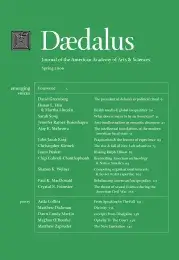The intellectual foundations of the modern American fiscal state
At the turn of the twentieth century, the U.S. system of public finance underwent a dramatic structural transformation. The late-nineteenth-century system of indirect national taxes–associated mainly with the highly partisan tariff and regressive excise taxes on alcohol and tobacco–was eclipsed in the early twentieth century by a professionally administered, graduated income tax that soon accounted for more than half of all federal tax revenue. This seismic shift toward direct and progressive taxation marked the emergence of a new fiscal polity, one guided not simply by the functional need for revenue, but by social concerns about justice, fairness, and the equitable distribution of fiscal obligations.
The intellectual debates and political struggles that took place a century ago inform our current discussions about “fundamental” tax reform. In recent years, American scholars, policy analysts, and lawmakers have decried the failings of the present U.S. tax system. At the same time, commentators have identified how the recent rise in inequality has signaled the arrival of a new Gilded Age in the United States. In an attempt to confront this increasing concentration of wealth and power, some present-day reformers have vowed to make profound changes to our existing progressive income and wealth-transfer taxes. A century ago, during a similar period of rising inequality, serious structural reform was not only envisioned but also achieved, and we would do well to recall the social and economic conditions, as well as the political will, that made that fundamental fiscal reform possible.
In the early twentieth century, the modern American fiscal state turned to direct and graduated taxes to reallocate the economic responsibilities of financing an emerging regulatory and administrative, social-welfare state. But the reformers who sought to usher in a new fiscal order intended to use tax laws and policies for much more: to redefine the meaning of modern citizenship; to facilitate a fundamental change in existing political arrangements; and, perhaps most important, to help underwrite the expansion of the American liberal state. To do all of this, tax activists understood that they needed to lay an intellectual foundation in support of direct and progressive taxation.
Among the critical reformers, a particular group of academic experts played a pivotal role in reconfiguring the meaning and implications of taxation. In a subtle, though significant, move, these economic and political theorists helped to supplant the prevailing “benefits theory” of taxation, and its attendant vision of the state as a passive protector of private property, with a more equitable principle of taxation based on one’s “faculty” or “ability to pay,” which demanded a more active role of the positive state. Led by the likes of Richard T. Ely, Henry Carter Adams, and Edwin R. A. Seligman, these German-trained, professional political economists helped dismantle the nineteenth-century orthodox theories of laissez-faire and promoted the adoption of new, more effective and egalitarian forms of taxation and state action.
. . .
